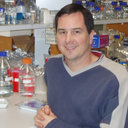A novel molecular mechanism to explain biotin-unresponsive holocarboxylase synthetase deficiency.
Palabras clave
Abstracto
Biotin (vitamins H and B7) is an important micronutrient as defects in its availability, metabolism or adsorption can cause serious illnesses, especially in the young. A key molecule in the biotin cycle is holocarboxylase synthetase (HLCS), which attaches biotin onto the biotin-dependent enzymes. Patients with congenital HLCS deficiency are prescribed oral biotin supplements that, in most cases, reverse the clinical symptoms. However, some patients respond poorly to biotin therapy and have an extremely poor long-term prognosis. Whilst a small number of mutations in the HLCS gene have been implicated, the molecular mechanisms that lead to the biotin-unresponsive phenotype are not understood. To improve our understanding of HLCS, limited proteolysis was performed together with yeast two-hybrid analysis. A structured domain within the N-terminal region that contained two missense mutations was identified in patients who were refractory to biotin therapy, namely p.L216R and p.L237P. Genetic studies demonstrated that the interaction between the enzyme and the protein substrate was disrupted by mutation. Further dissection of the binding mechanism using surface plasmon resonance demonstrated that the mutations reduced affinity for the substrate through a >15-fold increase in dissociation rate. Together, these data provide the first molecular explanation for HLCS-deficient patients that do not respond to biotin therapy.




